Electromagnets and the Motor Effect
1/33
There's no tags or description
Looks like no tags are added yet.
Name | Mastery | Learn | Test | Matching | Spaced | Call with Kai |
|---|
No analytics yet
Send a link to your students to track their progress
34 Terms
How can you increase the strength of a magnetic field a wire produces? Why does this increase the strength?
By wrapping the wire into a coil called a solenoid. This is because the field lines around each loop of wire line up with each other, resulting in lots of field lines pointing in the same direction that are very close to each other - the closer the field lines the stronger the field.
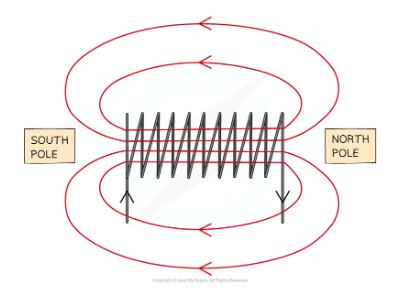
What is a solenoid?
A coil of wire which when a current passes through, creates a strong magnetic field.
Describe the magnetic field found inside a solenoid:
Strong and uniform - it has the same strength and direction at every point in that region.
Describe the magnetic field outside the coil:
The magnetic field outside the coil is just like one round a bar magnet.
How can you increase the magnetic field produced around a solenoid even more?
Increasing the size of the current flowing through the wire
Increasing the number of turns in the coil
By putting a block of iron in the centre of the coil. This iron core becomes an induced magnet whenever current is flowing
What is an electromagnet?
A solenoid with an added iron core, adding the iron core increases the strength of the magnetic field.
The magnetic field produced by an electromagnet can be switched…
On & off.
What happens when the current is switched off?
There will be no magnetic field produced around the electromagnet.
Examples of applications of electromagnets
Scrapyard cranes - when the electromagnet is switched on it will attract magnetic materials, and when it is off it will drop them
Electric bell
MRI scanners
Magnetic door locks
When does the motor effect occur?
When a wire, with current flowing through it, is placed in a magnetic field and experiences a force.
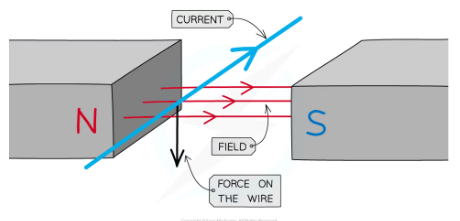
What is the motor effect the result of?
Two interacting magnetic fields.
What are these two magnetic fields produced from?
One is produced from the wire due to the current flowing through it. The second magnetic field is the one that the wire is placed in, for example between two magnets.
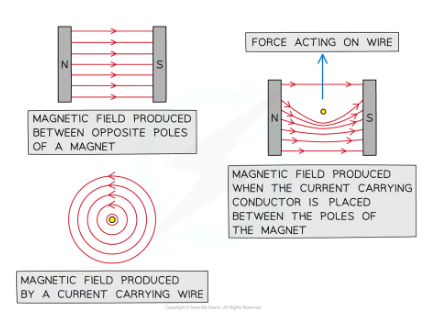
What rule is used to determine the direction of the force experienced due to the motor effect?
Fleming’s Left Hand rule.
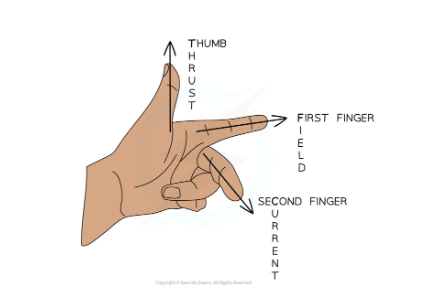
What does the direction of the force on a current-carrying wire depend on?
The direction of the current & the direction of the magnetic field.
Which finger is used to represent the direction of the magnetic field?
The first/index finger.
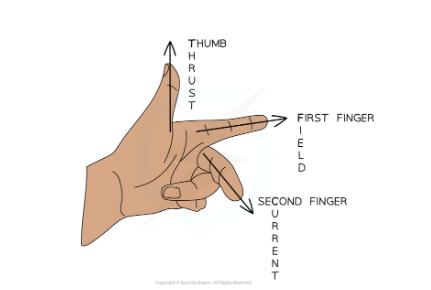
Which finger is used to represent the direction of the current?
Second finger - middle finger. Rotate your hand around the first finger so that the second finger points in the direction of the current.
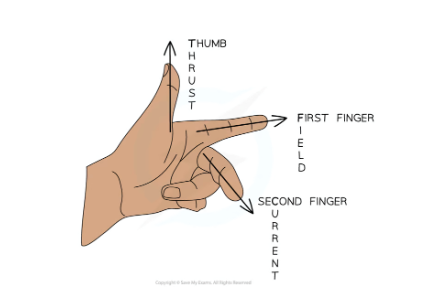
Which finger is used to represent the direction of the force/thrust?
The thumb points in the direction of the thrust (force), this is the direction the wire will move.
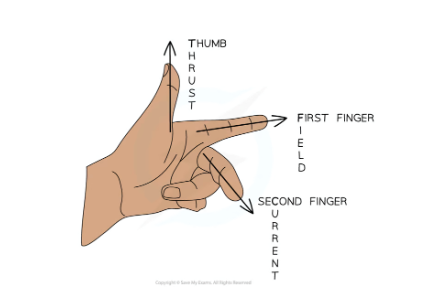
What factors affect the size of the force on a current-carrying wire in a magnetic field?
The magnitude of the current flowing through the conductor
Using stronger magnets - increasing the strength of the magnetic field that the conductor is placed in
If the direction of current in a current-carrying wire in a uniform magnetic field is reversed, what happens to the force?
The direction of the force is also reversed.
If the strength of the current in a current-carrying wire placed in a uniform magnetic field is increased, what happens to the force?
The strength of the force increases.
State the equation for the size of the force acting on a current-carrying wire in a magnetic field:
Force = Magnetic flux density x Curreny x Length(of the conductor)
F = BIL
What is the unit of magnetic flux density?
Tesla (T)
What is the unit of current?
Amperes (A)
What is the unit of length?
Metres (m)
When is the magnetic force on the magnet and conductor at its maximum?
When their fields are perpendicular to each other
What happens when the two magnetic fields are parallel?
There will be no interaction between the two magnetic fields and therefore no force will be produced - force = 0.
What can the motor effect be used to create?
A simple d.c. electric motor, the force on the current-carrying coil is used to make it rotate in one single direction.
Describe fully how an electric motor works. Refer to what it is made of and how it rotates.
A simple d.c. motor consists of a coil of wire positioned in a uniform magnetic field, this coil of wire forms a complete circuit with a cell when horizontal
The coil is attached to a split-ring and this is connected in a circuit with the cell via contact with conducting carbon brushes
Current flowing through a coil produces a magnetic field, this magnetic field interacts with the uniform external field so a force is exerted on the wire
Forces act in opposite directions on either side of the coil - causing it to rotate
Once the coil has rotated 90°, the split ring is no longer in contact with the brushes so no current flows and no forces act.
But despite lack of force, the momentum of the coil causes the coil to continue rotating slightly so the split-ring reconnects with the carbon brushes and current flows through the coil again
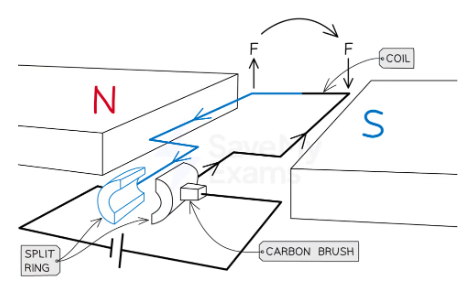
The speed at which the coil rotates can be increased by:
Increasing the current
Using a stronger magnet
The direction of rotation of coil in the d.c. motor can be changed by:
Reversing the direction of the current supply
Reversing the direction of the magnetic field by reversing the poles of the magnet
The force supplied by the motor can be increased by:
Increasing current in the coil
Increasing the strength of the magnetic field
Adding more turns to the coil
What are two things that use the motor effect?
Loudspeakers
Headphones
What do loudspeakers consist of?
A coil of wire which is wrapped around the pole of a permanent magnet.
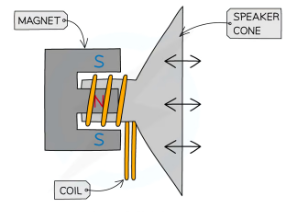
How do loudspeakers make use of the motor effect?
An alternating current passes through the coil of the loudspeaker and this creates a magnetic field around the coil.
As the current constantly changes direction, the direction of the magnetic field also constantly changes
The magnetic field produced around the coil interacts with the field from the permanent magnet, these interacting magnetic fields will exert a force on the wire
As mentioned above, the magnetic field is constantly changing direction so the the force exerted on the coil will constantly change direction, making the coil oscillate - making the speaker cone oscillate and therefore also the air, creating soundwaves.